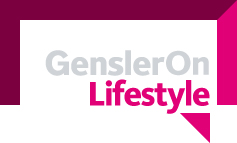The Future of Hotel Design: Human-Centred
Image © George Clerk.
Benjamin Franklin once said there are only two things certain in life: death and taxes. Well, I’d like to add a third one: change. Change is inevitable and it impacts on everything, not least on the way we design. Over the past 60 years, we have seen a rise in consumer culture, individualism and globalisation. As a result, modern societies are becoming more complex and trickier to understand.
So, as designers (or for that matter anyone with a product or service to market), how do we truly begin to understand these changes in order to develop solutions that truly meet people’s needs? Well, to start with, we need to move away from traditional demographics, which are now far from adequate.
Recently, Gensler took part in The Sleep Set design competition at Sleep 2016 (which we went on to win), to create a guestroom experience that pushes boundaries and explores new ideas for the future. The theme explored The Science of Tribes, a topic that really spoke to us.
The tribes in question and the science behind them have been developed by research and consulting institute Sinus. Aiming to make a multidimensional world easier to understand, Sinus grouped together people who are similar in their approach to life, value orientation and social situation, as well as those who demonstrate similar lifestyles and likings.
The non-hotel hotelHaving been assigned the ‘Digital Avant-Gardes' it soon became apparent that we were working with a contradiction. Would our tribe even stay in a hotel? Probably not. They would likely prefer alternative forms of accommodation over a traditional hotel; they appreciate the homeliness, flexibility, value and locality of these places.
So we did what we do best… we deconstructed. We focused our discussions on who these people really are and what they look for. As the discussion evolved key features started to appear: family, friends and good quality food seemed to be really important; technology that kept them connected to love ones, such as Facetime and the ever-vital charger, was highly valued. We needed to create an experience that was experimental and unscripted, highly sociable, community focused and creative.
Ask the right questionsSome of the questions we started to ask ourselves included: Could the hotel be for the community, as well as the guests? Could a hotel offer workshop space for local artists and makers in exchange for running a course occasionally? Could there be aspects within the concept that were based on a peer-to-peer economy? Could they have a repository for DIY tools that the community can rent out for people who rent in the area? Could a communal kitchen be stocked with the basics? Could they access a carpool or rentable bikes if they want to explore the city or beyond? Could the products you use also be bought from a local shop? Could visitors experience the city alongside people who live here?
The mentality of our tribe is flexibility equates to convenience; they want to be able to get up late, cook their own breakfast and not feel constrained by a hotel’s routine. As ideas developed, the search for a concept that met these criteria became apparent. What these people are looking for is somewhere that has character; a place where the staff are well-equipped with local knowledge to host guests and meet a variety of their different needs, as well as the surrounding community’s needs.
Gensler’s award-winning concept for the Digital Avant-Garde tribe for The Sleep Set 2016 competition. Image © Rueben Derrick.
Our concept is a platform for the community itself: for local illustrators, weavers, potters, joiners, jewellers, makers, leather workers, writers, graphic designers and others. This is not a static environment. By sharing ideas, experimenting and working together, the hotel will develop with the community. We wanted to create a journey of brief encounters, true stories and found sounds. We wanted to encourage the inquisitive—being open to all that our surroundings have to offer; to forage for the good, bad or peculiar.
To the future…We don’t believe our Sleep Set concept is a finished solution. It’s the start of a conversation, not just about the future of hotel design, but about the future of design. As designers in the built environment, we have a great responsibility to the communities, cultures and individuals we design for. It’s up to us, regardless of which tribe we’re designing for, to really understand how people lead their everyday lives, and how they think and feel, to offer progressive, intelligent solutions that do justice to the vast array of human values and lifestyles.
This post is part of a series on the future of hotel design. Stay tuned for more in this series.
 |
Claire Richmond is a senior associate and highly accomplished interior designer in Gensler’s London office. Her work reflects her passion for creating inspiring environments that are sensitive to their context and communities. Contact her at Claire_Richmond@gensler.com. |

 Claire Richmond
Claire Richmond 

